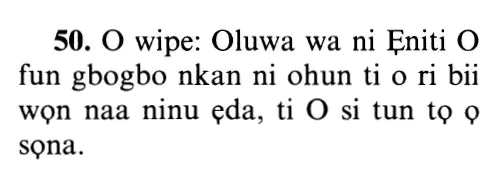20vs50
Select any filter and click on Go! to see results
قَالَ رَبُّنَا الَّذِي أَعْطَى كُلَّ شَيْءٍ خَلْقَهُ ثُمَّ هَدَى
Qala rabbuna allathee aAAta kulla shayin khalqahu thumma hada
Index Terms
Click to play
Yoruba Translation

Hausa Translation
Ya ce: "Ubangijinmu Shi ne wanda Ya bai wa dukan kõme halittarsa, sa´an nan Ya shiryar."
Asbabu n-Nuzuul (Occasions of Revelation)
قَالَ رَبُّنَا الَّذِي أَعْطَى كُلَّ شَيْءٍ خَلْقَهُ ثُمَّ هَدَى ﴿٥٠﴾
(Musa) said: "Our Lord is He Who gave to each thing its form and nature, then guided it aright.''
Ali bin Abi Talhah related that Ibn Abbas said,
"He is saying that He created a mate for everything.''
Ad-Dahhak said that Ibn Abbas said,
"He made the man a man, and the donkey a donkey and the sheep a sheep.''
Layth bin Abi Sulaym reported from Mujahid that he said,
"He gave everything its form.''
Ibn Abi Najih said that Mujahid said,
"He fashioned the creation of every moving creature.''
Sa`id bin Jubayr said concerning His statement, أَعْطَى كُلَّ شَيْءٍ خَلْقَهُ ثُمَّ هَدَى ((Who) gave to each thing its form and nature, then guided it aright),
"He gave each of His creatures what is suitable for its creation.''
Therefore, He did not give man the form of a wild beast, nor did He give wild beasts the form of the dog. Likewise, the dog's form is not like the sheep's. He also gave creature a suitable spouse, and He influenced everything towards that mate. There is no species of creation that is exactly like another species. They are different in their actions, their forms, their sustenance and their mating.
Some of the scholars of Tafsir have said that this statement, "He gave to each thing its form and nature, then guided it aright,'' is similar to Allah's statement,
وَالَّذِى قَدَّرَ فَهَدَى
And Who has measured; and then guided. (87:3)
This means He measured out an ordained amount (of sustenance, actions, etc.) and then guided His creatures to it. He wrote the deeds, the appointed times of death and the provisions. Then, the creatures traverse upon that and they are not able to avoid it, nor are they able to abandon it.
In this Ayah Musa is saying that our Lord is the One Who created the creation, measured out its ordainment and compelled the creatures to that which He wanted.
قوله " أعطى كل شيء خلقه ثم هدى " قال أعطى كل ذي خلق ما يصلحه من خلقه ولم يجعل للإنسان من خلق الدابة ولا للدابة من خلق الكلب ولا للكلب من خلق الشاة وأعطى كل شيء ما ينبغي له من النكاح وهيأ كل شيء على ذلك ليس شيء منها يشبه شيئا من أفعاله في الخلق والرزق والنكاح وقال بعض المفسرين أعطى كل شيء خلقه ثم هدى كقوله تعالى " الذي قدر فهدى " أي قدر قدرا وهدى الخلائق إليه أي كتب الأعمال والآجال والأرزاق ثم الخلائق ماشون على ذلك لا يحيدون عنه ولا يقدر أحد على الخروج يقول ربنا الذي خلق الخلق وقدر القدر وجبل الخليقة على ما أراد .
"قال ربنا الذي أعطى كل شيء" من الخلق "خلقه" الذي هو عليه متميز به عن غيره "ثم هدى" الحيوان منه إلى مطعمه ومشربه ومنكحه وغير ذلك
موسى .
I'raab - grammatical analysis of the Qur'an
«قالَ» الجملة ابتدائية «رَبُّنَا» مبتدأ ونا مضاف إليه والجملة مقول القول «الَّذِي» اسم موصول في محل رفع خبر «أَعْطى » الجملة لا محل لها لأنها صلة «كُلَّ» مفعول به أول «شَيْ ءٍ» مضاف إليه «خَلْقَهُ» مفعول به ثان «ثُمَّ هَدى » الجملة معطوفة على أعطى
